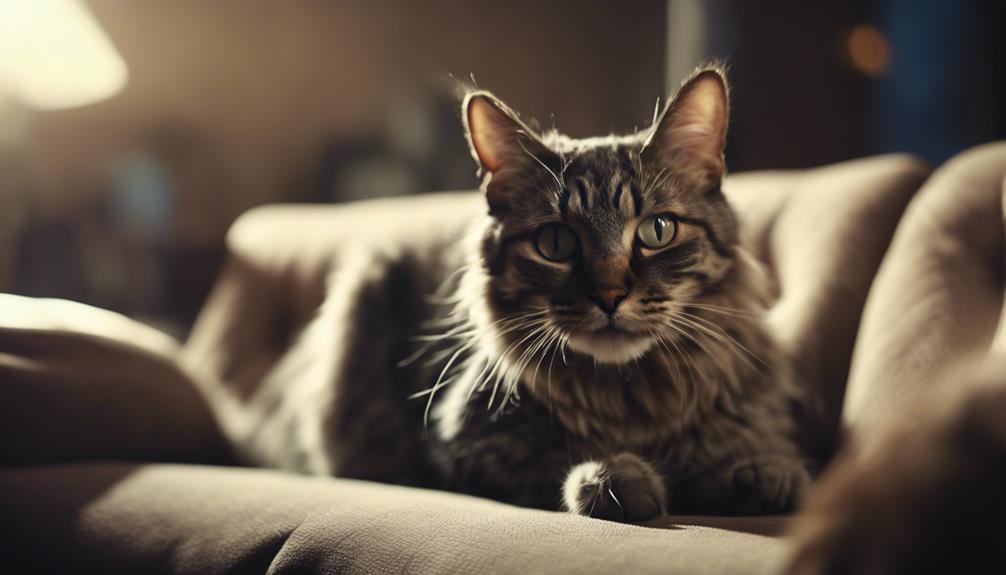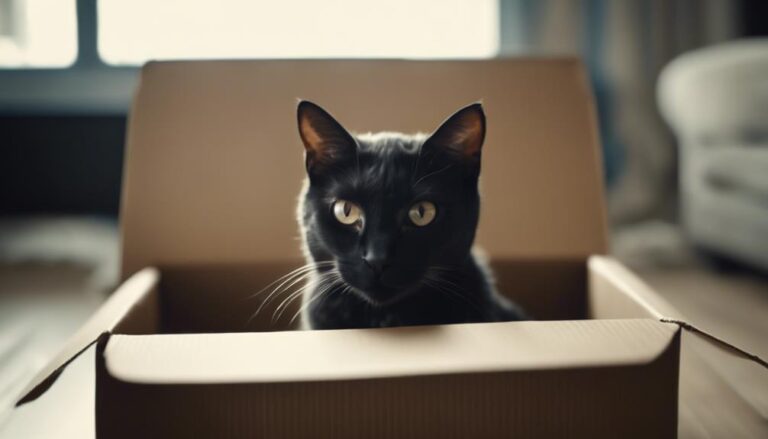If your cat trembles at the mere sight of the vacuum, you're not alone. The fear is real, but there are ways to ease their anxiety. From understanding the root of their fear to creating a safe haven during cleaning sessions, there are strategies to help your feline friend feel more at ease. But what if there was a simple yet effective method you haven't tried yet? Let's explore some lesser-known techniques that could make a world of difference for your scaredy-cat.
Understanding Your Cat's Fear
If you've ever wondered why your cat cowers at the sight of the vacuum cleaner, it's likely due to the loud noise and sudden movements it makes. For your feline friend, the vacuum can be a source of fear and anxiety. The loud roar of the vacuum may sound like a threatening predator, triggering your cat's natural instinct to flee or hide.
Additionally, the sudden movements and unpredictable nature of the vacuum cleaner can startle and confuse your cat, making them feel trapped and cornered.
In your cat's eyes, the vacuum cleaner may even resemble a monstrous creature, further intensifying their fear. Cats thrive in peaceful and predictable environments, so when a loud and disruptive appliance like a vacuum enters their space, it can shake their sense of security.
Understanding these reasons behind your cat's fear of vacuums can help you empathize with their feelings and work towards alleviating their anxiety.
Creating a Safe Environment
To ensure your cat feels secure and at ease during vacuuming, provide designated hiding spots such as cat trees or cozy nooks. These safe spaces can offer comfort and a sense of security when your cat is feeling afraid of the vacuum. Additionally, creating a safe environment involves establishing positive associations with the vacuum cleaner. You can achieve this by offering treats, playtime, or favorite toys near the vacuum to help your cat associate it with positive experiences.
Help your cat by setting up calming pheromone diffusers or sprays in the areas where they spend the most time. These products can contribute to a soothing atmosphere that eases your cat's anxiety. Playing soft music or white noise during vacuuming sessions can also help mask the sound of the vacuum cleaner, reducing your cat's stress levels.
Lastly, ensure there are multiple escape routes available for your cat in case they feel the need to retreat. By incorporating these strategies into your routine, you can help your cat feel more secure and less anxious around the vacuum cleaner.
Using Calming Techniques
Consider incorporating calming techniques such as providing treats, meals, or toys in a safe room during vacuuming to help alleviate your cat's fear. Here are some ways to make your cat feel more comfortable and fear-free during vacuuming sessions:
- Keep treats handy: Offering treats can create positive associations with the vacuum, helping your cat feel more at ease.
- Make the environment soothing: Using calming music, white noise machines, or calming pheromones can help your cat relax and feel less anxious.
- Get your cat comfortable with the sound: Gradual desensitization by leaving the vacuum out when not in use can help your cat get used to the noise over time.
Gradual Desensitization Methods
You can help your cat overcome its fear of the vacuum cleaner by gradually exposing them to it over time.
Start by leaving the vacuum out for them to see and smell, rewarding calm behavior with treats or playtime.
Slowly Increase Exposure
Gradually exposing your cat to the vacuum can help reduce their fear over time. To achieve this, consider the following steps:
- Start Slow: Leave the vacuum out in a room where your cat spends time, allowing them to get accustomed to its presence without it being turned on.
- Reward Calm Behavior: When your cat exhibits calm behavior around the vacuum, offer treats and praise to reinforce positive associations.
- Introduce Sounds Gradually: Slowly introduce the sound of the vacuum in different rooms over time, always rewarding good behavior to help your cat feel more at ease with the vacuum's presence.
Use Positive Reinforcement
Start by rewarding your cat with treats or praise when they exhibit calm behavior near the vacuum cleaner to help create positive associations. Positive reinforcement is a powerful tool in helping your cat overcome their fear of the vacuum.
Gradual desensitization involves slowly introducing the vacuum cleaner to your cat in a controlled manner. Reward any positive interaction, like approaching the vacuum without fear, to reinforce good behavior. Utilize clicker training or treats to establish positive associations with the vacuum.
Starting Desensitization Early
Beginning desensitization early can significantly benefit kittens in getting accustomed to the presence and noise of the vacuum cleaner. When starting early, you can:
- Build Trust: By introducing the vacuum gradually, kittens can learn that it's not a threat, helping to reduce their fear and anxiety over time.
- Create Positive Associations: Using positive reinforcement techniques like treats and playtime during vacuum exposure can help kittens associate the vacuum with good things, making them more comfortable around it.
- Promote Long-Term Comfort: Early desensitization lays the foundation for long-term benefits, as kittens are more adaptable and open to new experiences, which can help them overcome their fear of the vacuum cleaner as they grow older.
Consulting With a Vet
For tailored advice and strategies to help your cat overcome its fear of the vacuum, consulting with a vet is crucial. Vets can provide personalized guidance to address your cat's specific needs and fears. By consulting with a vet, you can rule out any underlying health issues that might be contributing to your cat's fear and ensure a comprehensive approach to tackling this issue.
When you consult with a vet about your cat's fear of the vacuum, they may recommend behavior modification techniques tailored to your cat's temperament and reactions. Additionally, vets can suggest calming aids or techniques to help desensitize your cat to the vacuum over time. This professional guidance ensures a safe and effective approach to managing your cat's fear in a way that's both compassionate and sustainable.
Frequently Asked Questions
How Do I Make My Cat Not Scared of the Vacuum?
To help your cat not be scared of the vacuum, gradually introduce it with treats and praise. Create positive associations by rewarding calm behavior. Use clicker training and end sessions positively with playtime. Your cat will feel more comfortable.
Why Are Cats Afraid of Vacuum?
Cats are afraid of vacuums due to the loud noise, sudden movements, and imposing appearance, which triggers their fear response. They may feel trapped and disrupted from their routines, leading to avoidance behaviors.
Will My Cat Get Used to the Vacuum Cleaner?
Your cat can get used to the vacuum cleaner with gradual exposure and positive reinforcement. Desensitize them by creating a safe space, using treats, toys, or calming aids. Consistent and patient training will help them overcome fear.
How Do You Vacuum a Kitten Without Scaring It?
To vacuum a kitten without scaring it, start by familiarizing the kitten with the vacuum cleaner gradually. Use treats and playtime for positive reinforcement and introduce the sound slowly. Monitor its reaction, provide reassurance, and end each session positively.





